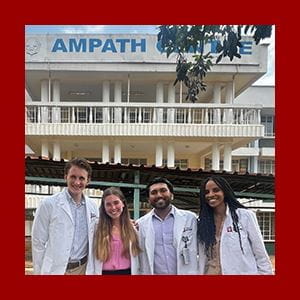Bethlehem Daniel is a rising 2nd-year student at IU School of Medicine. She spent the summer as a Slemenda Scholar with the AMPATH program in Eldoret, Kenya with support from the Brater Family Scholarship in Global Health and the Indiana University Medical Student Program for Research and Scholarship (IMPRS) program. She shares her thoughts about the experience.
I tried to come into my experience in Kenya with no expectations—I truly did.
I had been to East Africa in the past. In fact, a lot of my inspiration for attending medical school was motivated by my time in Ethiopia. As the daughter of immigrants from Ethiopia and Eritrea, my visits back home not only opened my eyes to its beauty, but the issues that continued to persist as well. Coming into my experience in Kenya, I vowed to start fresh. However, despite this personal pledge, I did have some preemptive notions of what I would expect to see. Within days of landing in Eldoret, I can confidently say that those expectations went out the window.
For some time now, I have been passionate about mental health work. Though my neuroscience-based coursework in college discussed mental health conditions, it was memoirs by authors like Pete Earley that continued to stick with me. These memoirs didn’t focus on the various hypotheses surrounding which neurotransmitter-dependent pathway led to a specific condition, but rather the impact these diagnoses had on the lives of the person affected and their loved ones. These narratives humanized conditions more than a list of classic symptoms or a set of statistics ever could. This sense of humanization is deeply embedded into the care given to patients at the Moi Teaching and Referral Hospital (MTRH) Nawiri Recovery and Skills Centre, a first-of-its-kind recovery home for adults living with severe mental illness in Eldoret, Kenya. And, we were lucky enough to tour the facilities within our first week in the city, courtesy of our team lead Dr. Zachary Gitlin.
We were welcomed to the compound by Mercy, a kind medical social worker whose passion for mental health emanated in all that she did. As we walked past luscious flowers (that Dr. Matthew Turissini had picked out she mentioned) and she discussed more about the work that she did, it became clear that she didn’t view her work here as merely a job. Later on, when I got further involved in research at Nawiri and got to work with Mercy a little more, she told me that she wanted to put her all into her work every single day to make the lives of the residents better because they didn’t get that anywhere else.
At Nawiri, the focus is not simply on recovery—but on sustainable reintegration into families, communities and greater society. In addition to offering traditional therapies and family-based therapy, the center also offers many unique resources. By teaching skills like basket weaving, sewing, car washing and more, the goal is to have residents leave the center with the ability to economically support themselves.
To be clear, there is a need for further work regarding mental health and access to care in Kenya. In high-income nations like the United States, there is an average of one psychiatrist for every fifteen thousand people [1]. In Kenya, as of 2020, there were about 120 psychiatrists for the entire country (about 1 for every 450,000 people) [2]. With many of these psychiatrists concentrated in urban areas, the need is especially large in rural communities [3]. In addition, both stigma and a lack of understanding of mental health conditions continue to be pressing issues. However, with growing interest in mental health across the country, all parties are moving in the right direction.
A few weeks prior, following a team meeting at Nawiri, I was walking back to Indiana University House with a few blankets my faculty mentor Dr. Turissini asked me to bring back. In true Nawiri fashion, despite my insistence (and self-proclaimed innovation to carry all the blankets), Mercy sent over an individual to help me carry them. His name was Vincent* and it was his first month working at Nawiri. He soon told me that he taught residents there. I asked him about his experience thus far and he was candid—he was initially afraid because he didn’t know what to expect, but he realized at the end of the day that “they were just people.”
“Just like you and me,“ I said.
“Just like you and me,” he repeated back.
*The pseudonym used in this article is intended to protect the privacy of individuals and does not reflect any real person's identity
Sources:
[1] WHO Mental Health Atlas (2014). World Health Organization. https://www.afro.who.int/sites/default/files/2017-06/9789241565011_eng.pdf
[2] Kwobah, E. K., Turissini, M., Barasa, J., Kimaiyo, M., Okeyo, L., Araka, J., Njiriri, F., Matundura, R., & Jaguga, F. (2023, May 25). Mental Healthcare Services in Kenyan Counties: A Descriptive Survey of Four Counties in Western Kenya - BMC Health Services Research. BioMed Central. https://bmchealthservres.biomedcentral.com/articles/10.1186/s12913-023-09481-w
[3] Reporter, S. (2019). This is How Expensive it is to Access Mental Healthcare in Kenya. The Standard. https://www.standardmedia.co.ke/business/article/2001300897/this-is-how-expensive-it-is-to-access-mental-healthcare-in-kenya
